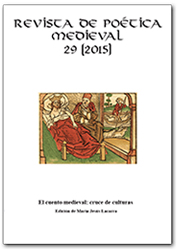The exemplar and doctrinal Tradition of The États du monde in the Rimado de Palacio of Pero López de Ayala
DOI:
https://doi.org/10.37536/RPM.2015.29.0.53248Keywords:
Estates, Social class, Satyre, Rimado de Palacio, Pero López de AyalaAbstract
The couplets 191 to 728 of the Rimado de Palacio display a critic of the society in the 14th century, which scholars have considered inspired in Guillermo Perrault’s Summae virtutum et vitiorum. Nevertheless, what Ayala is doing here is retaking a kind of literature which was to a great extent widespread in France, the genre of the États du monde. This paper intends to describe the poetics of this genre and to show the way in which Ayala adapts it to the reality of the 14th century Castile.
Downloads
Métricas alternativas
Downloads
How to Cite
Issue
Section
License
The opinions and facts stated in each article are the exclusive responsability of the authors. The University of Alcalá is not responsible in any case for the credibility and aunthenticity of the studies.
Authors will retain the rights on their work, even if they will be granting the journal a non-exclusive right of use to reproduce, edit, distribute, publicly communicate and show their work. Therefore, authors are free to enter into additional, independent contracts for non-exclusive distribution of the works published in this journal (such as uploading them to an institutional repository or publishing them in a book), as long as the fact that the manuscripts were first published in this journal is acknowledged.
Works are published under the terms stipulated in the Attribution-NonCommercial-ShareAlike 4.0 International License (CC BY-NC-SA 4.0) that allows third parties to share the work under the following conditions:
Attribution — You must give appropriate credit, provide a link to the license, and indicate if changes were made. You may do so in any reasonable manner, but not in any way that suggests the licensor endorses you or your use.
NonCommercial — You may not use the material for commercial purposes.
ShareAlike — If you remix, transform, or build upon the material, you must distribute your contributions under the same license as the original.










